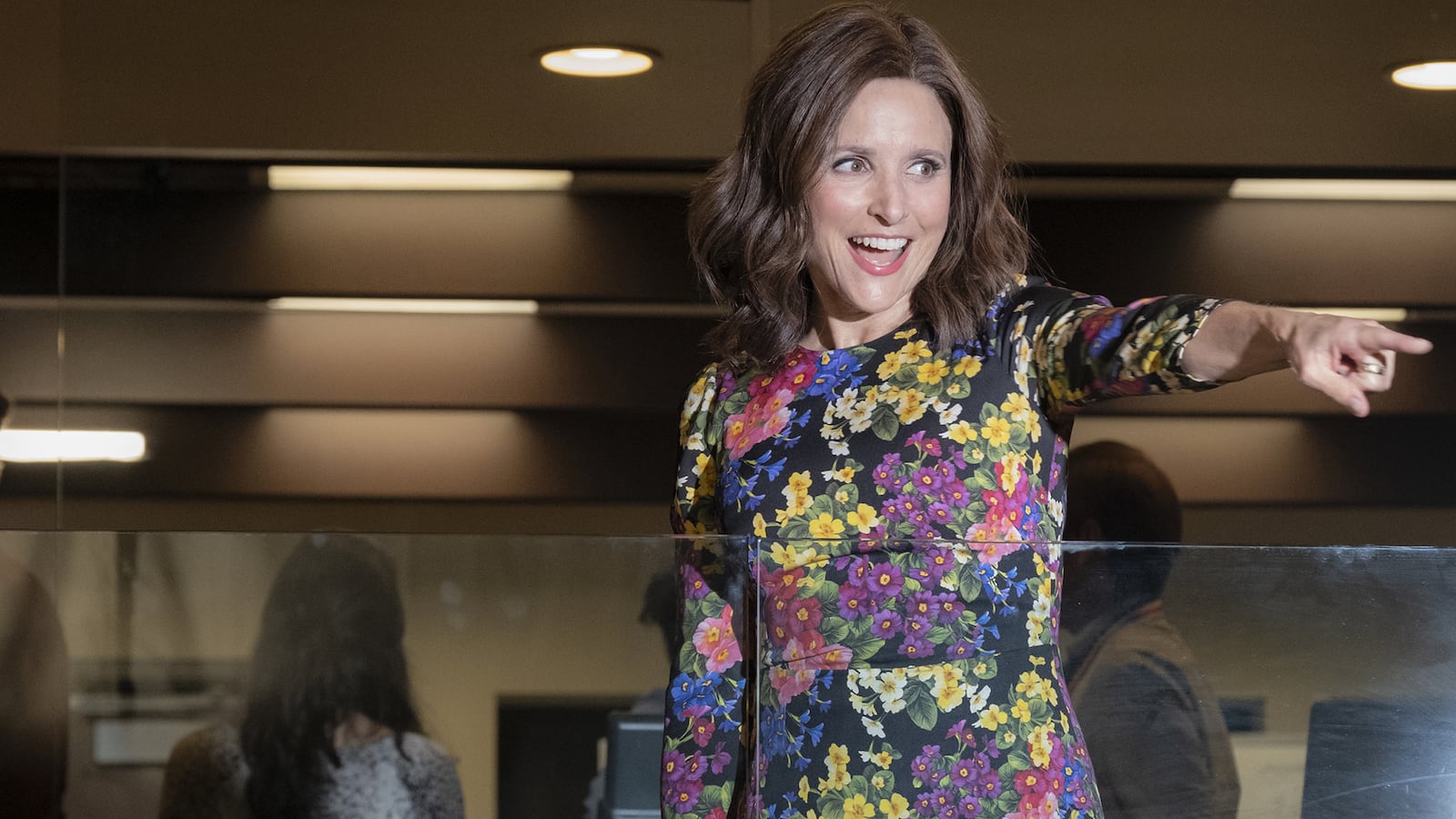Sunday night revealed what happens when a woman’s craven desire for power drives her mad. By the end of the episode on HBO, we were treated to the scorched earth left in her wake as she finally, as many had predicted—and some have feared—became the Mad Queen. Er, excuse me: the Mad President. (Mad-ame President. Hey-o!)
It’s perhaps by pure coincidence that so much of the series finale of Veep mirrored the controversial events of the Game of Thrones episode that aired before it, save for one crucial way in which the episodes diverged. In every way that characters behaving in angering, irrational ways or meeting unsatisfying fates pissed off fans of Thrones, it was deliciously gratifying on Veep.
Especially as series finales go, the episode was wildly, breathlessly plotted and paced, accomplishing more narrative in 45 minutes than most comedies do in a season. It all led up to an end that was harrowingly bleak, nihilistic, and so dark it nearly veered on glib. But in contrast to what happened on Thrones, and certainly in tonal opposition to nearly every great comedy series that came before it, every bit of that darkness was earned.
From the reckless, madcap nature of the pacing to the emptiness in all of the characters’ fates, it was a fitting an end to a political satire that was always, especially against the backdrop of the Trump administration, going to be nearly impossible to bring to a rational, let alone pleasing, conclusion. The Veep finale wrestled the challenge of making One Final Point—if there even was one to be made—about the nature of politics in America today, and won.
(It should be said, too, that no storyline airing on HBO Sunday night—not on Thrones, nor on the assassin-anxiety character study Barry—was as dark as what happens to Tony Hales’ Gary.)
Series finales, especially for comedy series, are supposed to be bittersweet and nostalgic. Had Veep not so fastidiously set up its universe and characters over the course of the last seven seasons, a final episode as callous, sinister, and savage as Sunday night’s would disorient, if not enrage viewers. But the episode was perfectly pitched, with a first half defined by deranged wackiness giving way to a final act that practically shivered, it was so cold.
Set largely at the nominating convention of Selina Meyer’s party (the show has never specified if it’s Democrat or Republican), the episode was a series of exploding landmines, various comeuppances for Selina’s past dastardly deeds that threaten her frontrunner status for the nomination and pave the path toward a terrifying inevitability: A return to obscurity.
Selina and her team essentially spend the first half of the episode in a hapless series of fire drills, desperately trying to salvage delegate votes as some amusing deus ex machina—Jonah being accidentally right about math and Muslims, Tom reentering the race—seems to ensure that she has no chance anymore. It takes Ben having a heart attack for her to realize exactly what it would take to win, and the depths of depravity she’d need to access to make it happen.
Julia Louis-Dreyfus delivers a tour de force once the episode takes this turn. That seems pat to say. She’s TV's greatest actress, period. But there’s a new level of exhilaration unleashed here as Selina bulldozes and barn-burns, so expeditious and damaging in her conniving plot that Drogon’s blaze of destruction seems like a puff of smoke in comparison.
No moral is left uncompromised and no ally is left un-betrayed as Selina outs Tom’s affair, negotiates gay marriage for votes, selects Jonah (!!!) as VP, and fingers a fall guy for the toxic Meyer Fund. She wins the nomination, and then, it’s revealed, the presidency.
A victory like that would seem cheap in the world of Veep. There has to be a cost, something so cruel that only Selina would be willing to go through it. So, after Gary, beaming with pride, applies Selina’s Dubonnet lipstick, we see that she has sent him as the sacrificial lamb to slaughter. She frames him for embezzlement in the Meyer fund, and the FBI whisks him, the only person to maybe truly care for Selina and with whom she’s made an actual human connection with, away.
Even Cersei would shudder at the coldness of it.
The last few seasons of Veep have, in a way, been miraculous.
It’s a political satire that found comedy in the extremes of our governing bodies: the ineptitude, the ego, the shocking crassness and the unapologetic selfishness. But reality has brought those extremes from behind the curtain and into everyday life, to the extent that the ludicrous has become the mundane. Wringing any laughs from it, let alone actually astute and observant comedy, has been TV’s greatest magic trick.
We see through the show’s funhouse mirror, albeit one with a reflection that has been increasingly less warped, our own political nature: the disconnect between policy and people, and the disregard for life, liberty, and pursuit of happiness when all that matters is the pursuit of power. The system is broken, and the fate of our country is in the hands of the lunatics depraved enough to wade through the shards of glass.
There’s a realism to all the cynicism, which is underscored in the flash-forward that ends the series. We see Selina finally sitting in the Oval Office as an elected president, and it’s hollow. Everything and everyone she had to abuse and discard along the way have made the victory lonely and joyless. It was the journey, maybe not the destination, it turns out, that has fueled her.
Echoing the “what was it all for?” nature of it all is the second flash forward, 24 years into the future to her funeral.
The last series I can remember that employed the flash-forward in a way that felt earned and not lazy was Parks and Recreation, which used the jump to assure fans that their beloved characters all received happy endings. The Veep flash-forward bucks against that in every way.
Perhaps the most crucial reveal of the epilogue is that there is no redemption for these characters, save for Gary, who arrives to pay respects despite how she betrayed him: “You’d hate the flowers, but I brought the Dubonnet.” Heartbreaking.
Even more cutting was the news’ quick pivot from remembering Selina to reporting the death of Tom Hanks, sweeping any care about her death to the side. Even in death, the glory for Selina is fleeting. The legacy of Veep, however, will be anything but.







